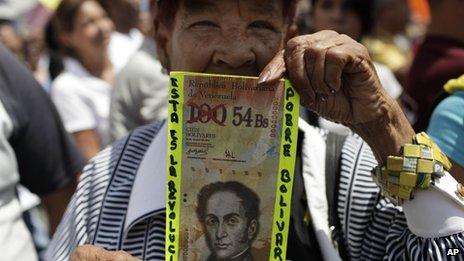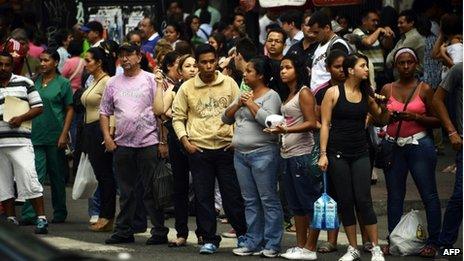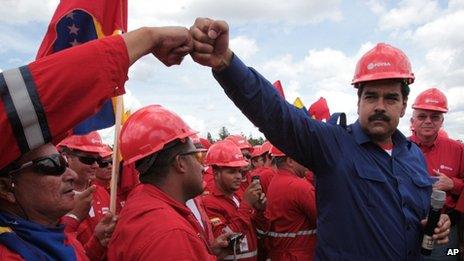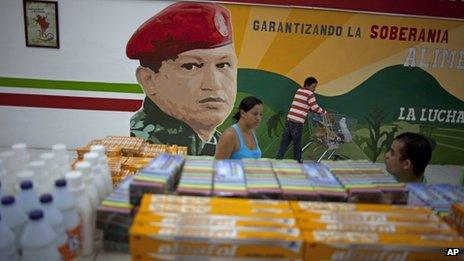Venezuela's economic woes: Sabotage or mismanagement?
- Published

Many blame currency controls for Venezuela's economic problems
Theories abound in Venezuela regarding Tuesday's blackout which affected more than two-thirds of the country.
While President Nicolas Maduro has accused political opponents of sabotaging the power system, the opposition blames government incompetence for the largest power cut in five years.
As parts of the country are still facing problems with the electricity and the political finger-pointing continues, many are asking just how vulnerable Venezuela's infrastructure is.
The capital, Caracas, is not used to the power cuts which have become quite common in other regions.
On Tuesday, cash machines, traffic lights and the underground stopped working. There was traffic chaos, with some people stuck in train carriages.
'Lack of investment'
Thousands of workers poured into the streets, with many finding it hard to make their way down from upper floors when emergency lamps turned out to be faulty.
Jose Manuel Puente, an economist at the IESA School of Management, says the power cut is a sign of a wider malaise.
"Unfortunately what happened on Tuesday is similar to what's happening to the country's entire infrastructure. Investment in certain areas has been reduced to minimum under [Hugo Chavez's Bolivarian] revolution," he explained.
"What we see now is an inexorable consequence of over a decade of unbalanced economic policies."
Most supporters of the late president and his successor Nicolas Maduro would not agree with Mr Puente's analysis.
But even Finance Minister Nelson Merentes recently acknowledged that the economic policies followed by the government had not been successful.

With the underground not working, people queued for buses during the blackout
In a television interview broadcast on the weekend, he called for reforms to tackle structural economic problems.
"This is a government that has won 18 elections, that has had social achievements," he told TV channel Televen. "But it still has to be successful on the economy."
Oil riches
Since Mr Chavez came to power in 1999, the government has succeeded in reducing inequality, poverty and malnutrition, according to various United Nations and World Bank indexes.
Huge investment in the social sector, government subsidies and price controls on staple foods, fuelled by revenues from Venezuela's oil industry, have been behind its achievements in narrowing the gap between the rich and poor.
Venezuela has the world's largest reserves of oil, which make up 95% of the country's total exports.

State-oil company PDVSA is a huge source of revenue for Venezuela
The downside to some of these social-oriented policies has been that they created distortions in the economy, say analysts.
One of the most controversial policies was brought in in 2003, when the government set a fixed rate for foreign currency exchange.
The move was designed to keep government control over prices and to make certain basic items, such as bread and rice, more affordable to the poor.
Black market
Under the currency controls, people and businesses can receive US dollars at the official rate only by applying to a government currency agency, and then only for the purpose of importing goods or to pay for foreign travel.
The amount of dollars available at the official rate is restricted, causing the black market to flourish.
The official exchange rate is 6.30 bolivars to the dollar. On the black market, the exchange rate is six times higher.
While changing money on the black market is a crime, finding traders is extremely easy and Venezuelans calculate their cost of living according to the black market exchange rates.
"Every aspect of Venezuela's economy depends on the distortion of the market provoked by the fixed exchange rate," says Francisco Ibarra, a director at Econometrica, an economic think-tank close to the opposition.
And some analysts on the other side of the political spectrum agree Venezuela's currency controls are problematic.
"The fixed exchange rate is what has provoked most damage," acknowledges Victor Alvarez, a former minister of industry under Mr Chavez.
"When the price of a currency remains frozen in time, while prices of goods and services go up … it creates a very harmful phenomenon," Mr Alvarez told Venezuelan financial newspaper El Mundo.
When using the official market rate, Caracas is among the 10 most expensive cities in the world as measured by the Economist's 2013 Big Mac index.
The index uses the price of a hamburger to compare living costs around the world.
In Venezuela, a Big Mac will set you back over $10 (£6.40).
Shortages
Many say the fixed exchange rate is also to blame for other problems the Venezuelan economy is experiencing.
Analysts say that imports become difficult because companies cannot access dollars. They say this, combined with an inadequate domestic production of food staples and dependence on imports, is creating shortages.

Hugo Chavez introduced price control for staple goods
According to the Central Bank, the scarcity index is currently at 18%, meaning that out of 100 goods, 18 are not available.
Venezuela also suffers from the highest inflation rates in Latin America. Prices go up regularly for items that are not subsidised and protected by the government.
Pineapples used to cost 20 bolivars in March ($3 on the official exchange rate), but now they are double that.
Minimum wages have gone up, but not enough to catch up with the inflation.
"Venezuela has the worst macroeconomic indicators in the entire region," says Mr Puente. "The lowest growth rates, the highest inflation and the highest shortages index."
"Mr Merentes understands this very serious unbalance and the necessity for change. But this is also a political problem."
Until his death, Mr Chavez had been hugely popular, winning four consecutive elections as president.
Mr Maduro, who won April's election by a razor-thin margin, cannot command the same support his predecessor enjoyed.
So far he has managed to blame many of the country's ills on opposition sabotage, and to keep together a government plagued by internal divisions.
But with local elections coming up in December, it seems unlikely he will risk pushing through economic reforms which, even if they could set the country on the right course, might prove unpopular and cause his party to lose votes.
- Published2 September 2013
- Published5 March 2013
- Published4 September 2013